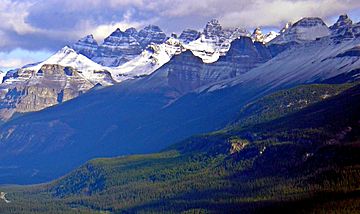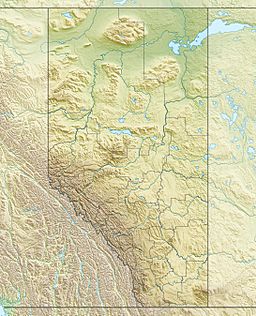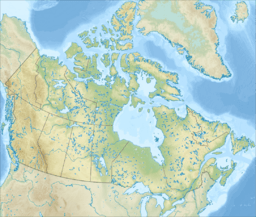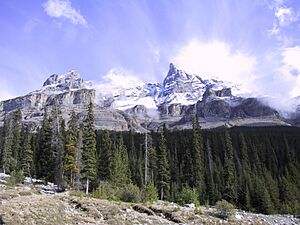Mount Murchison (Alberta) facts for kids
Quick facts for kids Mount Murchison |
|
|---|---|

Mount Murchison seen from Peyto Lake overlook at Bow Pass
|
|
| Highest point | |
| Elevation | 3,353 m (11,001 ft) |
| Prominence | 993 m (3,258 ft) |
| Parent peak | Mount Hector (3394 m) |
| Listing | Mountains of Alberta |
| Naming | |
| Etymology | Roderick Murchison |
| Geography | |
| Location | Alberta, Canada |
| Parent range | Murchison Group Canadian Rockies |
| Topo map | NTS 82N/15 |
| Geology | |
| Age of rock | Cambrian |
| Type of rock | Sedimentary |
| Climbing | |
| First ascent | August 25, 1996 by Reg Bonney, Rick Collier, John Holmes, Jerre Skvaril |
| Easiest route | technical climb |
Mount Murchison is a very tall mountain in Banff National Park, Alberta, Canada. It stands 3,353-metre (11,001 ft) high. This mountain is located where the North Saskatchewan River and Mistaya River valleys meet.
Mount Murchison has two main high points. The Southeast Peak is the tallest at 3,353 meters. The Northwest Peak is a bit lower at 3,333 meters. These two peaks are about 700 meters apart. The closest mountain that is taller than Mount Murchison is Mount Cline, which is about 15.71 km (9.76 mi) to the north.
You can find Mount Murchison near a place called Saskatchewan Crossing. This is where the North Saskatchewan River, Mistaya River, and Howse River all join together. The Icefields Parkway and the David Thompson Highway also meet here.
Contents
History of Mount Murchison
The mountain was named by James Hector in September 1858. He was exploring the Mistaya Valley at the time. Mount Murchison is named after Sir Roderick Impey Murchison (1792-1871). He was a famous English geologist and led the Geological Survey of Great Britain.
The mountain's name officially became Mount Murchison in 1924. The Northwest Peak was first climbed in 1902. The climbers were Norman Collie, H.E.M. Stutfield, G.M. Weed, and Hans Kaufmann. The Southeast Peak was first climbed much later, on August 25, 1996. The team included Reg Bonney, Rick Collier, John Holmes, and Jerre Skvaril.
What Mount Murchison is Made Of
Like other mountains in Banff National Park, Mount Murchison is made of sedimentary rock. This type of rock formed from layers of sand, mud, and shells that settled in ancient shallow seas. Over millions of years, these layers hardened into rock.
This sedimentary rock was pushed up and over younger rock during a time called the Laramide orogeny. This was a period when huge forces deep inside the Earth caused the land to fold and uplift, creating mountains.
Mount Murchison is a large mountain area, covering about five by seven kilometers (7400 acres). It has seven rocky towers and is partly covered by glacial ice from the Murchison Icefield.
Towers of Murchison
Mount Murchison has several distinct rock towers. Here are some of them:
| Name | Elevation | Prominence | First Ascent |
|---|---|---|---|
| Hall Tower | 3216 m | 183 m | 1940 |
| Bison Tower | 3185 m | 183 m | |
| Cromwell Tower | 3213 m | 28 m | |
| Feuz Tower | 3124 m | 183 m | 1941 |
| Gest Tower | 3170 m | 690 m | 1937 |
| South East Tower | 3094 m | 153 m | 1939 |
| Englehard Tower | 3216 m | 366 m |
Climate Around Mount Murchison
Mount Murchison is in a subarctic climate zone. This means it has very cold, snowy winters and mild summers. Temperatures can drop below -20 °C, and with wind, it can feel even colder, below -30 °C.
The cold winter weather makes Mount Murchison a popular spot for ice climbing in the Canadian Rockies. Water from melting snow and ice on Mount Murchison flows into streams and rivers that eventually join the Saskatchewan River.
Ice Climbing Routes
Mount Murchison is known for its challenging ice climbing routes. Here are some of them, with their difficulty grades:
- But My Daddy's a Psycho - WI5
- Murchison Falls - WI4-5
- Virtual Reality - WI6
- Balfour Wall - WI 2-4
- Cosmic Messenger - WI5
- Imaginary Voyage - WI3
- Laughter in the Dark - WI4
- Alien Abduction - WI5
- Syndrome - WI6
Images for kids
 | Valerie Thomas |
 | Frederick McKinley Jones |
 | George Edward Alcorn Jr. |
 | Thomas Mensah |




